Ecology
AAe provide a complete ecological service to the Development, Construction and Land Regeneration sectors. This involves undertaking field surveys and baseline studies, through to developing detailed designs and mitigation, and can provide expert witness advice.
Our team hold protected species licences and are fully conversant with current legislation and members of appropriate bodies such as the Chartered Institute of Ecology and Environmental Management. Our ecologists provide expertise on a wide range of ecological services, including those to the right.
Species Surveys
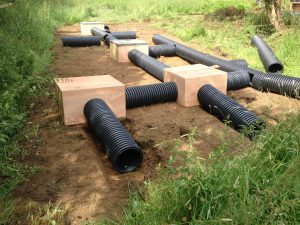 AAe’s ecologists provide support on projects where the presence of badgers may need to be taken into consideration and advise on guidance and practical solutions to ensure the scheme does not contravene current legislation protecting badgers and their setts (Protection of Badgers Act 1992). Services include:
AAe’s ecologists provide support on projects where the presence of badgers may need to be taken into consideration and advise on guidance and practical solutions to ensure the scheme does not contravene current legislation protecting badgers and their setts (Protection of Badgers Act 1992). Services include:
- Badger surveys – to establish whether badgers may or may not be active on the site, or immediate surrounding area;
- Bait marking – to help establish and provide clear information on the location of badger territories in the area;
- Applying for licences to close setts;
- Badger mitigation – including the complete supervision of excluding badgers from setts (under licence), construction of artificial setts and habitat enhancement.
AAe work with Natural England and the Local Authority in the Client’s interest to provide a workable solution and suitable mitigation for the project
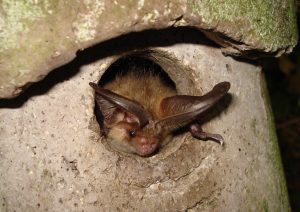 AAe’s ecologists provide support on projects where the presence of badgers may need to be taken into consideration and advise on guidance and practical solutions to ensure the scheme does not contravene current legislation protecting badgers and their setts (Protection of Badgers Act 1992). Services include:
AAe’s ecologists provide support on projects where the presence of badgers may need to be taken into consideration and advise on guidance and practical solutions to ensure the scheme does not contravene current legislation protecting badgers and their setts (Protection of Badgers Act 1992). Services include:
- Badger surveys – to establish whether badgers may or may not be active on the site, or immediate surrounding area;
- Bait marking – to help establish and provide clear information on the location of badger territories in the area;
- Applying for licences to close setts;
- Badger mitigation – including the complete supervision of excluding badgers from setts (under licence), construction of artificial setts and habitat enhancement.
AAe work with Natural England and the Local Authority in the Client’s interest to provide a workable solution and suitable mitigation for the project
 AAe’s ecologists are experience in surveying for a wide variety of wild birds, including barn owls, wintering birds, nesting birds and breeding birds. Our team can determine whether the scheme will require a specific bird survey. AAe can also advise on avoiding any negative impacts the development may have on wild birds and applying mitigation and compensation methods when avoidance is not possible.
AAe’s ecologists are experience in surveying for a wide variety of wild birds, including barn owls, wintering birds, nesting birds and breeding birds. Our team can determine whether the scheme will require a specific bird survey. AAe can also advise on avoiding any negative impacts the development may have on wild birds and applying mitigation and compensation methods when avoidance is not possible.
Services that AAe can provide include:
- Liaison with local record centres, bird clues etc. to establish whether a wild bird survey may be needed on a development site.
- Advise on preventing birds nesting before a development takes place.
- Advise on providing replacement nesting sites for any that are removed.
- Recommend and source a suitable amount of replacement habitat where birds are displaced, especially Section 41 birds and red and amber listed species.
- Post-development monitoring where birds are displaced or affected by development.
- Production of Bird Control/Hazard Management Plans in accordance with the Civil Aviation Authority.
 AAe’s ecologists have extensive experience in surveying for dormice and can provide survey reports and mitigation plans for any development projects that could affect dormice. They can also advise and oversee applying for mitigation licenses, and the supervision of their implementation.
AAe’s ecologists have extensive experience in surveying for dormice and can provide survey reports and mitigation plans for any development projects that could affect dormice. They can also advise and oversee applying for mitigation licenses, and the supervision of their implementation.
Our ecologists are experienced in a range of survey techniques including:
- Nest tube surveys
- Nest box surveys
- Nut search surveys
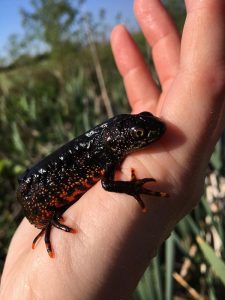 AAe’s ecologist are fully rehearsed in a range of great crested newt survey techniques and can produce concise advice, reports and mitigation at all stages of development. Within the team, there are licensed surveyors with in-depth knowledge of survey methods, mitigation measures, and licensing requirements. AAe can provide the following survey services:
AAe’s ecologist are fully rehearsed in a range of great crested newt survey techniques and can produce concise advice, reports and mitigation at all stages of development. Within the team, there are licensed surveyors with in-depth knowledge of survey methods, mitigation measures, and licensing requirements. AAe can provide the following survey services:
- Initial site appraisal using the Habitat Suitability Index (HSI);
- Presence/absence and monitoring surveys using eDNA testing or traditional surveying techniques; and
- Population size class assessments.
AAe ecologists will work with the Client to develop a workable mitigation solution. AAe can provide non-licenced method statements under avoidance measures. Where impacts cannot be avoided, AAe can implement mitigation and translocation plans. AAe are experienced in securing EPS licences allowing works to proceed. AAe will guide the Client through the entire licensing process.
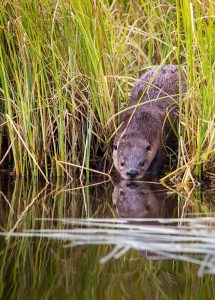 AAe’s ecologists have extensive experience in surveying for otters and can provide survey reports and mitigation plans for any development projects that could affect otters. They can provide advice on cost-effective and practical solutions to avoiding any negative impacts of the development on otters but, where impacts are unavoidable, advise and oversee applying for mitigation licenses, and the supervision of their implementation
AAe’s ecologists have extensive experience in surveying for otters and can provide survey reports and mitigation plans for any development projects that could affect otters. They can provide advice on cost-effective and practical solutions to avoiding any negative impacts of the development on otters but, where impacts are unavoidable, advise and oversee applying for mitigation licenses, and the supervision of their implementation
Surveying techniques including searching for evidence of otters, such as:
- dung (spraints)
- tracks (footprints)
- feeding remains
- otter slides (into water)
- holts (underground dens)
- couches (above ground sites where otters rest during the day)
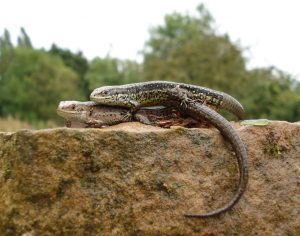 AAe’s ecologists undertake reptile surveys and mitigation for all native species in the U.K. This includes common lizards, sand lizards, slow worms, smooth snakes, grass snakes and adders. AAe undertake site specific survey requirements and mitigation for development and construction projects of all sizes. Services include:
AAe’s ecologists undertake reptile surveys and mitigation for all native species in the U.K. This includes common lizards, sand lizards, slow worms, smooth snakes, grass snakes and adders. AAe undertake site specific survey requirements and mitigation for development and construction projects of all sizes. Services include:
- Preliminary Ecological Appraisals;
- Method Statements and mitigation design;
- Hand-searches, destructive search and watching briefs;
- Translocation surveys; and
- Completion of report to support Client requirements.
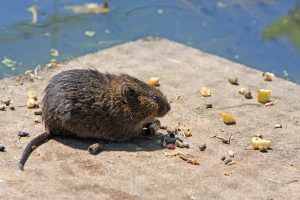 AAe’s ecologists have extensive experience in surveying for water voles and can provide survey reports and mitigation plans for any development projects that could affect water voles. They can also advise and oversee applying for mitigation licenses, and the supervision of their implementation.
AAe’s ecologists have extensive experience in surveying for water voles and can provide survey reports and mitigation plans for any development projects that could affect water voles. They can also advise and oversee applying for mitigation licenses, and the supervision of their implementation.
Survey techniques used include recording signs of:
- Faeces;
- Latrines;
- feeding stations;
- burrows;
- footprints;
- runs or pathways.
Habitat and Ecological Management
AAe are able to provide comprehensive and detailed management plans tailored specifically to the needs of the Client. AAe will work with the client to deliver a management plan that contains site-specific processes and instructions to help manage and enhance the biodiversity value of the site and the surrounding area. AAe can provide a complete service including liaising with third party stakeholders and statutory consultees. AAe can provide information leaflets to be included within the properties welcome pack identifying the measures implemented on site to increase the biodiversity value.
AAe can provide management plans for a range of habitats including;
- Green and Brown Roofs
- Woodland
- Wildflower
- Hedgerows
- Ponds/Watercourses
AAe’s ecology team has experience in providing ecology expert witness services to public inquiries and examinations. The services they provide include:
- Appraisal of the ecology case
- Attendance at conferences with the inquiry team, client and counsel
- Preparation of written representations and proofs of evidence
- Preparation of cross-examination notes for counsel
- Preparation of detailed papers on specialist subjects
- Drafting of Statements of Common Ground
- Preparation and presentation of oral evidence
- Preparation of rebuttal proofs
- Preparation and presentation of evidence to court proceedings
If invasive species are present on a development site AAe’s ecology team can advise on strategies to deal with them. AAe can also offer management services such as:
- Identification of invasive species in the field
- Implementation of control methods
- Monitoring and management of sites with invasive species
- Over-seeing supervision of control methods by contractors
AAe understands the economic and time implications of invasive species and aims to provide effective and practical advice on their control and management.
Ecology can be an important factor in gaining credits under BREEAM and the Code for Sustainable Homes (CfSH). AAe can provide a complete ecological assessment of a site from a Suitably Qualified Ecologist (as defined by BRE) and assess a site’s current ecological value and provide ways in which this can be retained and enhanced in order to maximise the credits that can be awarded under the scheme.
Services AAe can provide are:
- BREEAM/CfSH surveys;
- Complete the relevant template report to determine the number of credits that are achieved under the current scheme design;
- Provide recommendations of how additional credits could be achieved, using simple and cost-effective solutions;
- Provision of long term ecological management plans to accompany BREEAM assessments.
Ecological Assessments
AAe are able to provide expertise and support in all stages of the Ecological Impact Assessment (EcIA). These include:
- Initial project design: including discussing key ecological considerations about the project design (and alternatives) with the project proposer and the design team (e.g. engineers, architects) and recommend modifications to the design to avoid negative ecological impacts or, where this is not possible, to reduce them
- Screening: carrying out Preliminary Ecological Appraisals and providing justification if ecology does not need to be taken forward as part of the formal EIA
- Scoping: determining the issues needed to be covered by the EcIA such as identify any potential licensing requirements for survey and/or development regarding legally protected species
- Impact Assessment: including determining the importance of ecological features affected and the scale and magnitude of the impacts on them
- Evolution of project design and mitigation: identifying mitigation measures and opportunities for enhancement, as well as information on implementing mitigation strategies (e.g. Environmental management Plan (EMP))
- Identify significant residual effects and their legal, policy and development management consequences
- The final EcIA report: clearly sets out all the ecological information necessary for a robust decision to be made
- Follow-up and monitoring: including implementation of conditions/planning agreements and taking measures to rectify unexpected negative impacts and ineffective mitigation, compensation, enhancement measures.
Invertebrates are critical to Britain’s biodiversity and many are protected under the Wildlife and Countryside Act 1981 and the Natural Environment and Rural Communities Act 2006. AAe’s ecologists are able to provide a complete consultancy service regarding invertebrates.
Our services include:
- Site appraisal
- Invertebrate surveys
- Species determination
- Impact assessment
- Specialist mitigation and compensation strategies
Preliminary Ecological Appraisals (PEAs) are used to establish baseline conditions and assess the importance of ecological features and/or protected species present (or those that could be present) within the site and surrounding area and are the standard ecology report to support the majority of planning submissions. AAe can also use Preliminary Ecological Appraisals to:
- Establish any requirements for further surveys
- Identify key constraints to the project and make recommendations for design options to avoid significant effects on important ecological features/resources at an early stage
- Identify appropriate and proportionate mitigation measures
- to identify enhancement opportunities
AAe will also use Preliminary Ecological Appraisals to inform site management plans and gather baseline data for BREEAM/Code for Sustainable Homes ecology credits. AAe understand that the detail required for any ecological survey and assessment will depend on the nature of the development, statutory requirements and the needs of the Client and the regulator.
